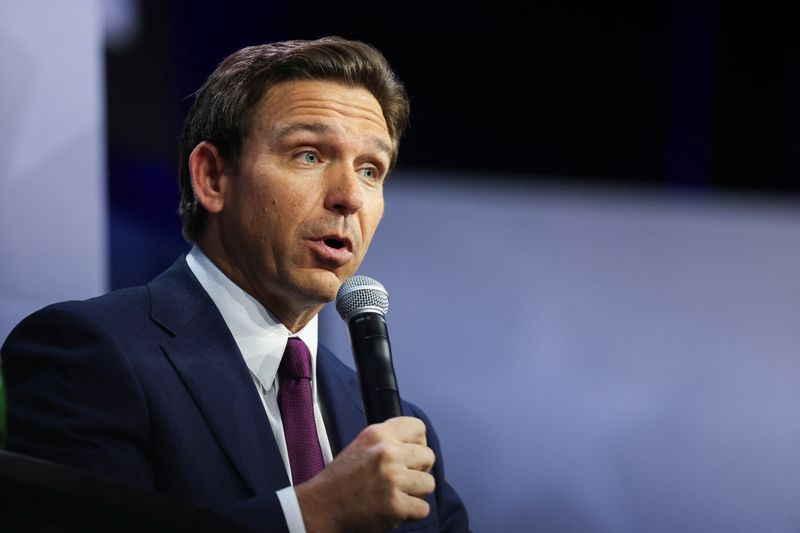Investing.com’s stocks of the week
By James Oliphant
WASHINGTON (Reuters) - As Republican Ron DeSantis attempts to reset his flagging presidential campaign, one fundamental feature of the Florida governor's candidacy remains constant: his willingness to antagonize corporate America over cultural and political issues.
DeSantis last week ordered Florida officials to open a probe into the company that owns Bud Light beer over concerns that it violated its duties to shareholders by engaging in a marketing deal with a transgender social media star that triggered a boycott by conservatives and a drop in sales.
The move signaled DeSantis is not about to abandon his crusade against so-called woke corporations, even at the risk of turning off the no-drama, moderate voters he may need either to win the Republican nomination or next year’s general election.
DeSantis trails Republican front-runner Donald Trump by more than 20 points nationally in the 2024 primary race. The governor's inclination to pick fights with some of America's biggest companies has rattled some wealthy donors and Republicans who worry the party is straying from its traditional "hands-off" approach to the economy.
But it is in keeping in what has become a dramatic reorientation of the base of the Republican Party in recent years away from moneyed elites to working-class and rural voters who view multi-national corporations with suspicion.
DeSantis' most high-profile battle has been against Disney over the company’s resistance to a Florida law that restricts the teaching of gender identity and sexuality concepts to school children. He has also gone after financial firms, tech giants and the pharmaceutical industry over a host of issues.
Alex Conant, a Republican consultant in Washington who has a roster of corporate clients, said focus groups with voters have shown that some Republicans are wary of government interfering with the internal management of companies.
“Republicans have to be careful not to turn into Democrats,” Conant said. “Just because voters don’t like big business doesn’t mean they want Republicans running big business.”
A Reuters/Ipsos poll taken in April at the height of the Disney fight showed that 62% of Americans, including 55% of Republicans, were less likely to back a candidate who punished companies for their political views.
But a Republican lobbyist in Washington who represents several Fortune 500 companies said DeSantis’ approach is sound for winning the Republican primary.
“DeSantis is doing what he’s doing because it's good politics,” said the lobbyist, who asked to remain unidentified so as to not take sides in the presidential race. “Our voters have turned on the business community. That shift has occurred.”
'NOT YOUR FRIEND'
The party's turn away from corporate America has been a decade in the making and is grounded in several socioeconomic factors, including the defection of college-educated voters to the Democratic Party, the off-shoring of manufacturing jobs and growing economic inequality between affluent coastal sectors and the country's interior.
DeSantis and his campaign have pushed back against the claim by Disney CEO Bob Iger and other critics that he is anti-business, pointing to how he has fostered economic growth and job creation in Florida.
As of June, the state had experienced a private-sector job growth rate that has exceeded the nation’s rate for 26 consecutive months, according to state officials.
Asked about DeSantis’ philosophy, his campaign pointed to an interview the candidate gave in May to a conservative magazine in which he said, “corporate America is not your friend on a lot of things.”
If corporations gain too much power, DeSantis said, “you're going to end up seeing the economy and society go in ways that may not be advantageous for the majority of the people.”
In a speech on Wednesday to a conservative public policy group, DeSantis said corporations that follow environmental, social, and corporate governance principles "are effectively doing the bidding of lot of ruling elites in government, and they're doing through the economy what they could never achieve at the ballot box."
Trump has ripped DeSantis for the Disney fight while also criticizing the company for being “woke.”
After conservatives launched a boycott of Bud Light in the wake of an endorsement deal with transgender influencer Dylan Mulvaney, Trump’s son, Donald Trump Jr., urged it to stop, noting that Bud Light’s parent company, Anheuser-Busch InBev, has long donated to Republican candidates.
A company spokesman told Reuters that "Anheuser-Busch InBev takes our responsibility to our shareholders, employees, distributors and customers seriously."
Last week, DeSantis said he had launched an investigation of the financial ratings firm Morningstar for utilizing ratings that he said discriminate against Israel in violation of Florida law. Morningstar in a statement said it has undertaken internal reviews to ensure its ratings are free from bias.
On the trail, DeSantis has accused the Food and Drug Administration of being “captured” by the pharmaceutical industry. He also has blasted tech companies for what he calls social-media political bias.
At the same time, DeSantis’ campaign and the top super PAC supporting him, Never Back Down, have benefited from corporate interests as they have relied on large donations from a network of deep-pocketed donors. Never Back Down, in particular, has raised more than $70 million since launching in March.
